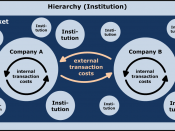Businesses have been conducting transactions with each other electronically for decades in the form of EDI, its adoption has been limited to large firms, due to cost and technical limitations, as well as requiring pre-established relationships between trading partners. Internet-based online marketplaces are now emerging in the hope that they will supersede EDI for business-to-business (B2B) transactions and collaborations. They also intend to displace traditional intermediaries by leveraging their superior search and transaction cost efficiency. However, recent research has shown that "although many observers applauded the bright prospects of B2B e-marketplaces, the verdict rendered by the marketplace to date has been far less positive" (Dai and Kauffman, 2002).
Startup failures, tumbling stock prices, and shakeouts have led to the attitude shift from exuberance to caution. "In 2000 Business-to-Business (B2B) e-commerce was projected to rocket from $209 billion to $1.4 trillion by 2004. With over half of that being conducted through e-marketplaces" (Le, 2002).
Although between mid-1998 and mid-2000 approx. 1800 public e-marketplaces were created, by 2002 400 were closed down with many more expected to follow. This is due to the fact that very few attracted sufficient trading volume to sustain their operations, let alone make profit. The demise of many e-marketplaces has led me to ask where they are going wrong in attracting potential buyers and sellers.
The remainder of this paper proceeds as follows. The following section defines what a B2B e-marketplace is, which then leads on to a discussion about the incentives for participants to join an e-marketplace. The next section then looks at the possible negative effects that e-marketplaces have on B2B relationships and thus suggests possible reasons why e-marketplaces have trouble attracting participants. Conclusions are drawn in the final section.
E-MARKETPLACES DEFINED
There are many different definitions of an 'e-marketplace', which started in 1991 when...



Very wordy
This essay is good, however it has a lot of depth on the topic.... this essay will only be good if you know about the topic yourself already.
0 out of 0 people found this comment useful.